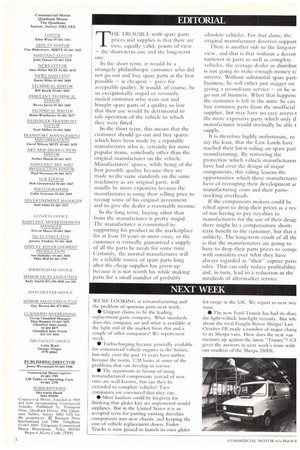T 11E TROUBLE with spare parts prices and supplies is that
Page 2

If you've noticed an error in this article please click here to report it so we can fix it.
there arc two, equally valid, points of view — the short-term one and the long-term one.
In the short term, it would be a strangely philanthropic customer who did not go out and buy spare parts at the best possible — ic cheapest — price for acceptable quality. It would, of course, be an exceptionally stupid or seriously misled customer who went out and bought spare parts of a quality so low that their use would be detrimental to safe operation of the vehicle to which they were fitted.
In the short term, this means that the customer should go out and buy spares which have been made by a reputable manufacturer who is, certainly for more popular items, somebody other than the original manufacturer on the vehicle. Manufacturers' spares, while being of the best possible quality because they are made to the same standards on the same machinery as arc original parts, will usually be more expensive because the manufacturer is using their selling price to recoup some of his original investment and to give the dealer a reasonable income.
In the long term, buying other than from the manufacturer is pretty stupid. The manufacturer is committed to supporting his product in the marketplace for at least 10 years in most cases, so the customer is virtually guaranteed a supply of all the parts he needs for some time. Certainly, the normal manufacturer will be a reliable source of spare parts long after the cheap supplier has given up because it is not worth his while making parts for a small number of probably obsolete vehicles. For that alone, the original manufacturer deserves support There is another side to the long-ter view, and that is that without a decent turnover in parts as well as complete vehicles, the average dealer or distribut is not going to make enough money tc survive. Without substantial spare part: business, he will either just stagger on giving a second-rate service — or he w. go out of business. When that happens the customer is left in the mire: he can buy common parts from the unofficial supplier, but may have no easy access t the more expensive parts which only ti manufacturer would normally be able t supply.
It is therefore highly unfortunate, to say the least, that the Law Lords have reached their latest ruling on spare part. manufacturing. By removing the protection which vehicle manufacturers have had over the design of major components, this ruling lessens thc opportunities which those manufacture] have of recouping their development ar manufacturing costs and their partsstocking overheads.
If the components makers could be relied upon to drop their prices as a res] of not having to pay royalties to manufacturers for the use of their desig: there might be a compensatory shortterm benefit to the customer, but that unlikely. The long-term result of all thi is that the manufacturers are going to have to drop their parts prices to comp with outsiders over what they have always regarded as "their" captive parts sales. That can only reduce profitability and, in turn, lead to a reduction in the standards of a ftermarket service.






































































